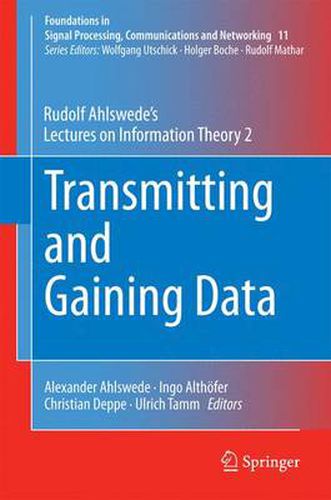Transmitting and Gaining Data: Rudolf Ahlswede's Lectures on Information Theory 2
Rudolf Ahlswede

Transmitting and Gaining Data: Rudolf Ahlswede’s Lectures on Information Theory 2
Rudolf Ahlswede
This title is printed to order. This book may have been self-published. If so, we cannot guarantee the quality of the content. In the main most books will have gone through the editing process however some may not. We therefore suggest that you be aware of this before ordering this book. If in doubt check either the author or publisher’s details as we are unable to accept any returns unless they are faulty. Please contact us if you have any questions.
The calculation of channel capacities was one of Rudolf Ahlswede’s specialties and is the main topic of this second volume of his Lectures on Information Theory. Here we find a detailed account of some very classical material from the early days of Information Theory, including developments from the USA, Russia, Hungary and (which Ahlswede was probably in a unique position to describe) the German school centered around his supervisor Konrad Jacobs. These lectures made an approach to a rigorous justification of the foundations of Information Theory. This is the second of several volumes documenting Rudolf Ahlswede’s lectures on Information Theory. Each volume includes comments from an invited well-known expert. In the supplement to the present volume, Gerhard Kramer contributes his insights.
Classical information processing concerns the main tasks of gaining knowledge and the storage, transmission and hiding of data. The first task is the prime goal of Statistics. For transmission and hiding data, Shannon developed an impressive mathematical theory called Information Theory, which he based on probabilistic models. The theory largely involves the concept of codes with small error probabilities in spite of noise in the transmission, which is modeled by channels. The lectures presented in this work are suitable for graduate students in Mathematics, and also for those working in Theoretical Computer Science, Physics, and Electrical Engineering with a background in basic Mathematics. The lectures can be used as the basis for courses or to supplement courses in many ways. Ph.D. students will also find research problems, often with conjectures, that offer potential subjects for a thesis. More advanced researchers may find questions which form the basis of entire research programs.
This item is not currently in-stock. It can be ordered online and is expected to ship in 7-14 days
Our stock data is updated periodically, and availability may change throughout the day for in-demand items. Please call the relevant shop for the most current stock information. Prices are subject to change without notice.
Sign in or become a Readings Member to add this title to a wishlist.


